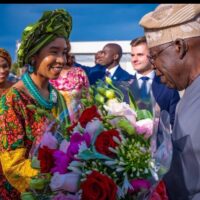Now, Tinubu can inspect election materials – Court
Now, Tinubu can inspect election materials – Court
Wednesday, March 8, 2023 10:34 pm
Jethro Ibileke
The President-elect, Asiwaju Bola Tinubu, has been given permission to access sensitive materials used by the Independent Electoral Commission (INEC) for the conduct of the 2023 presidential election.
The leave was granted by the Presidential Election Petition Tribunal sitting at the Court of Appeal, Abuja.
The ex-parte application filed by Tinubu on 6 March, has Peter Obi, the Labour Party, LP, as respondents; while INEC, the Peoples Democratic Party, PDP, and its candidate, Alhaji Atiku Abubakar, are respondents in the second application.
The All Progressives Congress, APC presidential flag bearer in the election, through his lawyer, Mr Akintola Makinde, urged the Appellate Court to order INEC to grant him access to sensitive materials it used for the election.
He said he would need to inspect, scan and make photocopies of some of the electoral materials to enable him to prepare his defence against petitions that would seek to nullify his election.
“The materials will be relevant in helping us to prepare our defence and also make comparison with the information contained in INEC’s back-end server,” Makinde told the three-man panel.
Delivering judgment in four rulings on Wednesday, the Court granted the reliefs sought by Tinubu and APC in the fourth motion ex-parte.
It however turned down prayers 5 and 6 in the motion filed by Tinubu.
Meanwhile, the Appellate Court has refused to restrain the Independent National Electoral Commission, INEC, from reconfiguring the Bimodal Voter Accreditation System, BVAS, ahead of the governorship and state assembly elections nationwide.
The presidential candidate of the Labour Party, LP, Peter Obi, had sought an order of the court “restraining the 1st respondent (INEC) from tampering with the information embedded in the BVAS machines until the due inspection is conducted and certified true copies (CTC) of them issued”.
Obi and LP, through their team of lawyers led by Onyechi Ikpeazu, said the essence of the application was to enable them to extract data embedded in the BVAS, which they said represent the actual results from polling units.
In the ruling delivered on Wednesday, a three-member panel of the Court of Appeal, led by Justice Joseph Ikyegh, held that restraining the electoral commission would constrain INEC from conducting the 11 March governorship and State Assembly elections.
Last week, Chairman of INEC, Prof. Mahmood Yakubu, declared Tinubu winner of the February 25 presidential election after securing majority of votes cast at the poll.
Moreover, he met the constitutional benchmark of scoring 25 per cent in two thirds of 36 states and the Federal Capital Territory (FCT), according to INEC.
The Court of Appeal on Friday , March 3, according to media reports, granted leave to Atiku Abubakar of the Peoples Democratic Party and Mr Peter Obi of the Labour Party, to inspect documents used by the Independent National Electoral Commission (INEC) for the conduct of the Feb. 25 Presidential election.
Abubakar and Obi had alleged that substantial non-compliance with the Electoral Act 2022 in addition to violence and rigging marred the conduct and outcome of the election.
On Tuesday, Tinubu through his lawyer, Mr Akintola Makinde, approached the court “seeking for leave of the court to allow them inspect and obtain election materials for his defence.”
However, the court of appeal has refused to stop INEC from reconfiguring the bimodal voter accreditation system (BVAS) ahead of the governorship and state assembly elections.
The Joseph Ikyegh led panel, held that restraining the electoral commission would constrain INEC from conducting the March 11 elections.
Peter Obi had sought an order of the court “restraining the 1st respondent (INEC) from tampering with the information embedded in the BVAS machines until the due inspection is conducted and certified true copies (CTC) of them issued”.


 32 mins ago
32 mins ago
 2 hours ago
2 hours ago  4 hours ago
4 hours ago  5 hours ago
5 hours ago  6 hours ago
6 hours ago  18 hours ago
18 hours ago  18 hours ago
18 hours ago  20 hours ago
20 hours ago
Join The Conversation